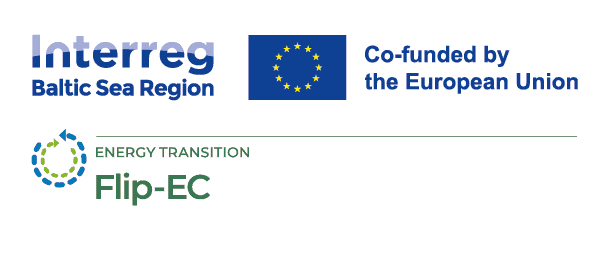
Flip-EC
Flipped energy concept to flip climate change
Flip-EC
Nations
Partners
Years
Buildings are responsible for approximately 40% of energy consumption and around 36% of greenhouse gas emissions in Europe. These emissions mainly arise from construction, use, renovation, and demolition. Public buildings play a special role in this context, as the public sector has a responsibility to lead by example in implementing energy efficiency measures and to credibly support Europe’s climate goals.
Nevertheless, the annual renovation rate of public buildings remains low. When it comes to reducing CO₂ emissions in buildings, technical solutions alone are not sufficient – operational processes and behaviour-related measures also play a crucial role. Projects in practice have shown that combining these approaches can reduce energy consumption by up to 30%.
The Flip-EC project, with its 11 committed partners, addresses this very point. It specifically promotes collaboration between public administrations and building users, raises awareness for sustainable actions, and supports a gradual, long-term change in behaviour. The Flip-EC consortium, consisting of municipalities, regional agencies, NGOs, and a school, brings together the Hanseatic City of Lübeck (Lead Partner), the municipalities of Smiltene, Birzai, Võru County, and Brøndby, as well as the partners Eduversum, the Regional Development Agency in Bielsko-Biała (ARRSA), the Social Innovation Center (SIC), the Lithuanian Innovation Center (LIC), and the Institute for Sustainable Development (ISD).
These partner institutions from six countries are working to increase the energy efficiency of public buildings through improved cooperation between building owners and users. Methods and trainings are being developed to motivate users to jointly implement energy-saving measures. Transnational cooperation is key to all activities within Flip-EC, implemented through regular thematic exchanges organized via various channels in the partner regions.
Objectives
Tasks of aconium GmbH
Programme:
Interreg Baltic Sea Region (BSR)
Client:
Hanseatic City of Lübeck
Tasks and functions of aconium GmbH:
- Project Management
- Financial Management
- Communication Management
Running Time:
01.03.2025 until 29.02.2028
aconium Contact Persons

Johanna Varanasi
Project Management
Mail: j.varanasi@aconium.eu
Phone: +49 341 962103-14

Johanna Schuppe
Deputy Project Management
Mail: j.schuppe@aconium.eu
Phone: +49 341 962103-11

Jonas Kratz
EU Finance Manager
Mail: j.kratz@aconium.eu
Phone: +49 341 962103-64

Daniel Yanev
EU Communications Manager
Mail: d.yanev@aconium.eu
Phone: +49 341 962103-02
